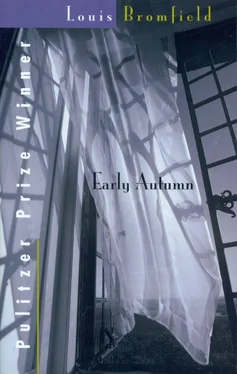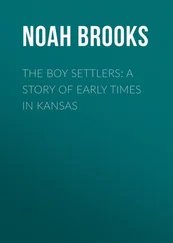“It’s about her chiefly,” he said, with the inevitable gesture toward the north wing. “She wasn’t always that way. That’s what I want to explain. You see … we were married when we were both very young. It was my father who wanted it. I was twenty and she was eighteen. My father had known her family always. They were cousins of ours, in a way, just as they were cousins of Sabine’s. He had gone to school with her father and they belonged to the same club and she was an only child with a prospect of coming into a great fortune. It’s an old story, you see, but a rather common one in our world. … All these things counted, and as for myself, I’d never had anything to do with women and I’d never been in love with anyone. I was very young. I think they saw it as a perfect match … made in the hard, prosperous Heaven of their dreams. She was very pretty … you can see even now that she must have been very pretty. … She was sweet, too, and innocent.” He coughed, and continued with a great effort. “She had … she had a mind like a little child’s. She knew nothing … a flower of innocence,” he added with a strange savagery.
And then, as if the effort were too much for him, he paused and sat staring out of the window toward the sea. To Olivia it seemed that he had slipped back across the years to the time when the poor old lady had been young and perhaps curiously shy of his ardent wooing. A silence settled again over the room, so profound that this time the faint, distant roaring of the surf on the rocks became audible, and then again the sound of Jean’s music breaking in upon them. He was playing another tune … not I’m in love again, but one called Ukulele Lady.
“I wish they’d stop that damned music!” said John Pentland.
“I’ll go,” began Olivia, rising.
“No … don’t go. You mustn’t go … not now.” He seemed anxious, almost terrified, perhaps by the fear that if he did not tell now he would never tell her the long story that he must tell to someone. “No, don’t go … not until I’ve finished, Olivia. I must finish. … I want you to know why such things happened as happened here yesterday and the day before in this room. … There’s no excuse, but what I have to tell you may explain it … a little.”
He rose and opening one of the bookcases, took out a bottle of whiskey. Looking at her, he said, “Don’t worry, Olivia, I shan’t repeat it. It’s only that I’m feeling weak. It will never happen again … what happened yesterday … never. I give you my word.”
He poured out a full glass and seated himself once more, drinking the stuff slowly while he talked.
“So we were married, I thinking that I was in love with her, because I knew nothing of such things … nothing. It wasn’t really love, you see. … Olivia, I’m going to tell you the truth … everything … all of the truth. It wasn’t really love, you see. It was only that she was the only woman I had ever approached in that way … and I was a strong, healthy young man.”
He began to speak more and more slowly, as if each word were thrust out by an immense effort of will. “And she knew nothing … nothing at all. She was,” he said bitterly, “all that a young woman was supposed to be. After the first night of the honeymoon, she was never quite the same again … never quite the same, Olivia. Do you know what that means? The honeymoon ended in a kind of madness, a fixed obsession. She’d been brought up to think of such things with a sacred horror and there was a touch of madness in her family. She was never the same again,” he repeated in a melancholy voice, “and when Anson was born she went quite out of her head. She would not see me or speak to me. She fancied that I had disgraced her forever … and after that she could never be left alone without someone to watch her. She never went out again in the world. …”
The voice died away into a hoarse whisper. The glass of whiskey had been emptied in a supreme effort to break through the shell which had closed him in from all the world, from Olivia, whom he cherished, perhaps even from Mrs. Soames, whom he had loved. In the distance the music still continued, this time as an accompaniment to the hard, loud voice of Thérèse singing, I’m in love again and the spring is a-comin’. … Thérèse, the dark, cynical, invincible Thérèse for whom life, from frogs to men, held very few secrets.
“But the story doesn’t end there,” continued John Pentland weakly. “It goes on … because I came to know what being in love might be when I met Mrs. Soames. … Only then,” he said sadly, as if he saw the tragedy from far off as a thing which had little to do with him. “Only then,” he repeated, “it was too late. After what I had done to her, it was too late to fall in love. I couldn’t abandon her. It was impossible. It ought never to have happened.” He straightened his tough old body and added, “I’ve told you all this, Olivia, because I wanted you to understand why sometimes I am …” He paused for a moment and then plunged ahead, “why I am a beast as I was yesterday. There have been times when it was the only way I could go on living. … And it harmed no one. There aren’t many who ever knew about it. … I always hid myself. There was never any spectacle.”
Slowly Olivia’s white hand stole across the polished surface of the desk and touched the brown, bony one that lay there now, quietly, like a hawk come to rest. She said nothing and yet the simple gesture carried an eloquence of which no words were capable. It brought tears into the burning eyes for the second time in the life of John Pentland. He had wept only once before … on the night of his grandson’s death. And they were not, Olivia knew, tears of self-pity, for there was no self-pity in the tough, rugged old body; they were tears at the spectacle of a tragedy in which he happened by accident to be concerned.
“I wanted you to know, my dear Olivia … that I have never been unfaithful to her, not once in all the years since our wedding night. … I know the world will never believe it, but I wanted you to know because, you see, you and Mrs. Soames are the only ones who matter to me … and she knows that it is true.”
And now that she knew the story was finished, she did not go away, because she knew that he wanted her to stay, sitting there beside him in silence, touching his hand. He was the sort of man—a man, she thought, like Michael—who needed women about him.
After a long time, he turned suddenly and asked, “This boy of Sybil’s—who is he? What is he like?”
“Sabine knows about him.”
“It’s that which makes me afraid. … He’s out of her world and I’m not so sure that I like it. In Sabine’s world it doesn’t matter who a person is or where he comes from so long as he’s clever and amusing.”
“I’ve watched him. … I’ve talked with him. I think him all that a girl could ask … a girl like Sybil, I mean. … I shouldn’t recommend him to a silly girl … he’d give such a wife a very bad time. Besides, I don’t think we can do much about it. Sybil, I think, has decided.”
“Has he asked her to marry him? Has he spoken to you?”
“I don’t know whether he’s asked her. He hasn’t spoken to me. Young men don’t bother about such things nowadays.”
“But Anson won’t like it. There’ll be trouble … and Cassie, too.”
“Yes … and still, if Sybil wants him, she’ll have him. I’ve tried to teach her that in a case like this … well,” she made a little gesture with her white hand, “that she should let nothing make any difference.”
He sat thoughtfully for a long time, and at last, without looking up and almost as if speaking to himself, he said, “There was once an elopement in the family. … Jared and Savina Pentland were married that way.”
Читать дальше












